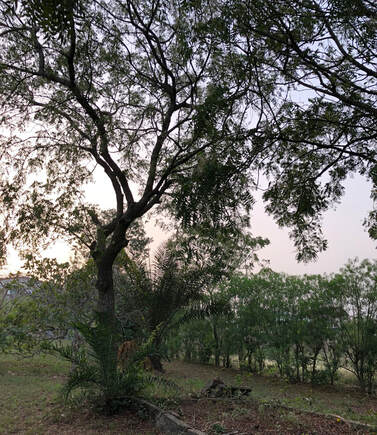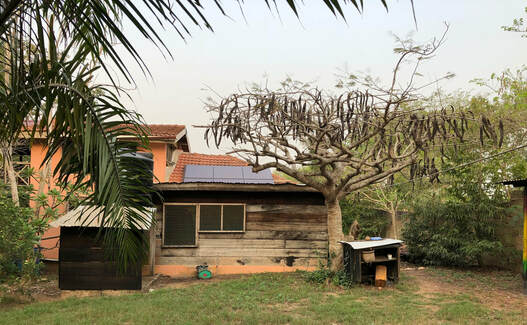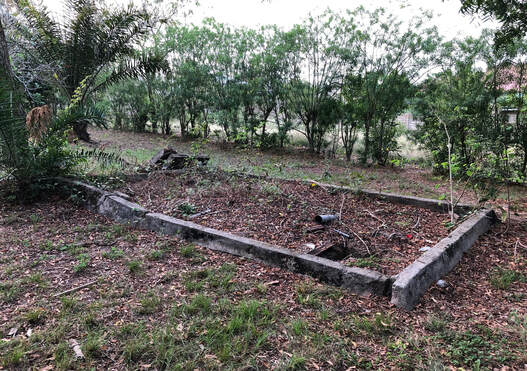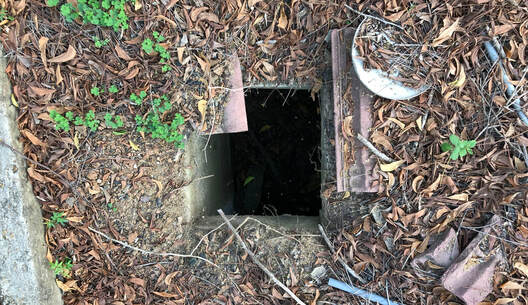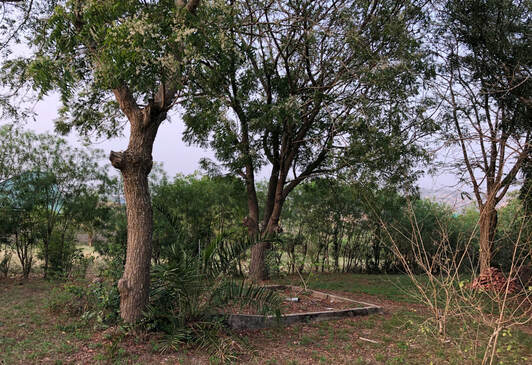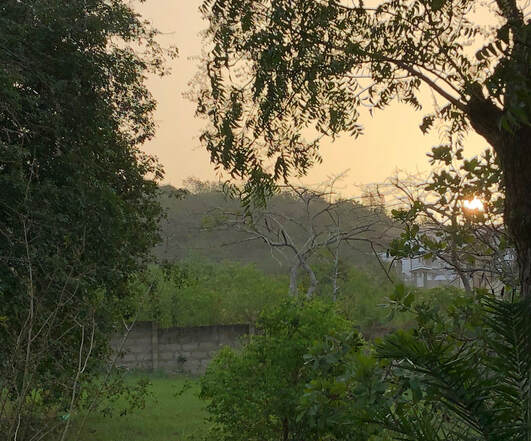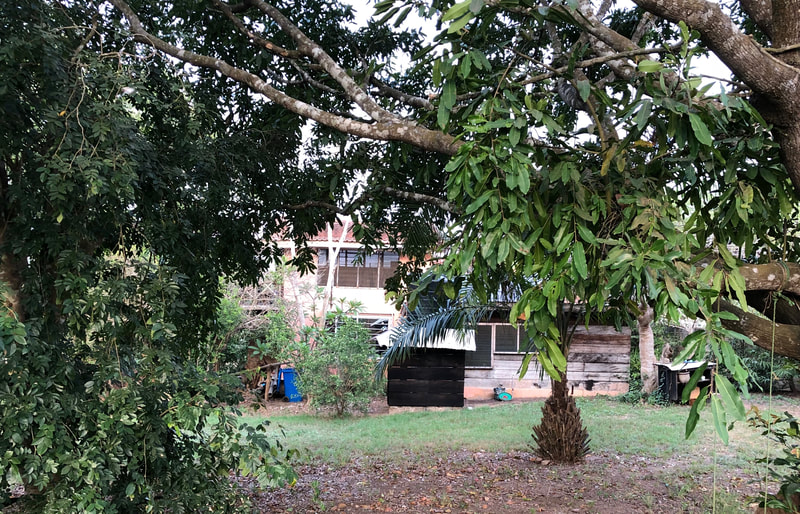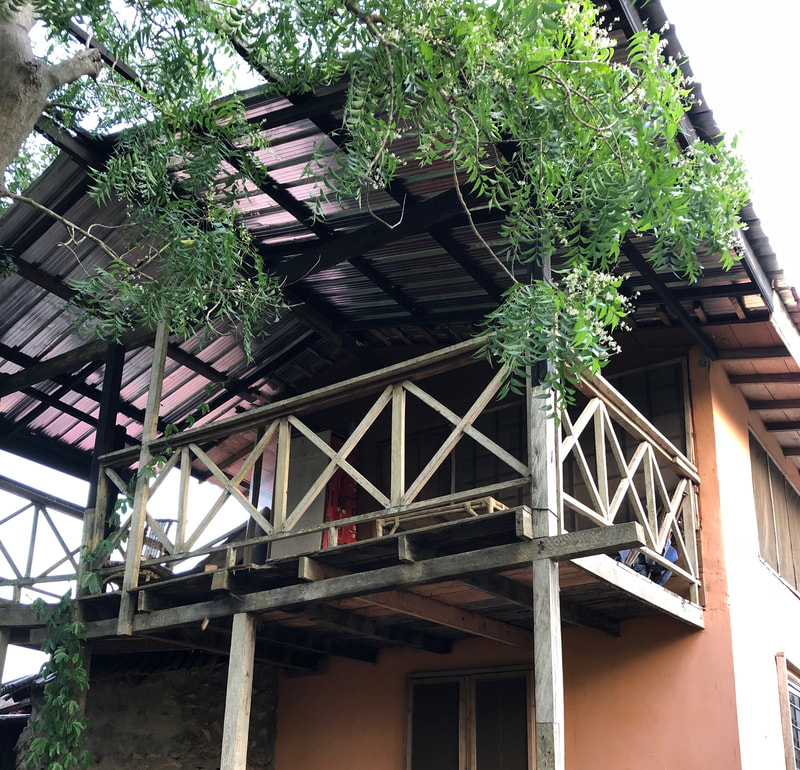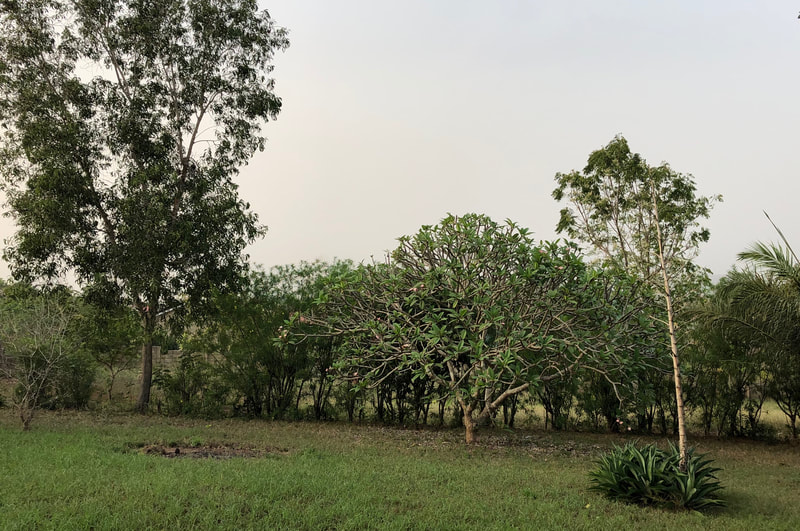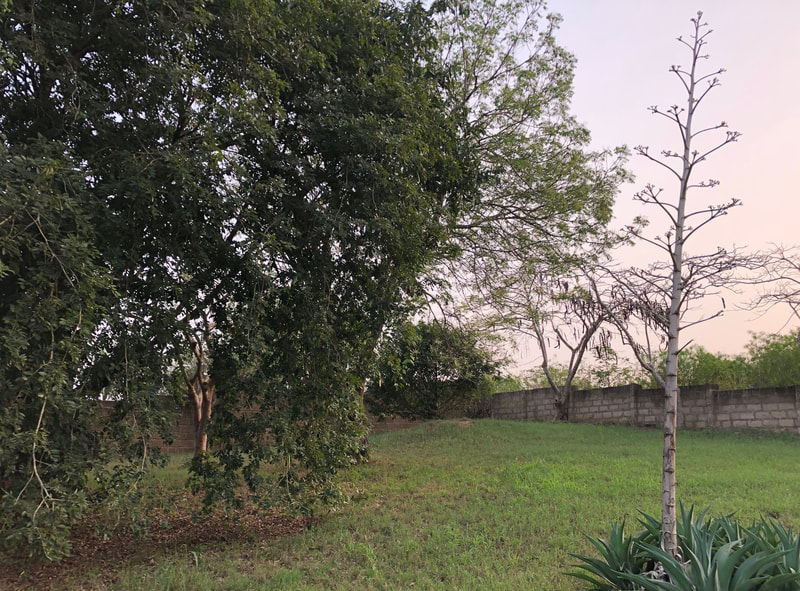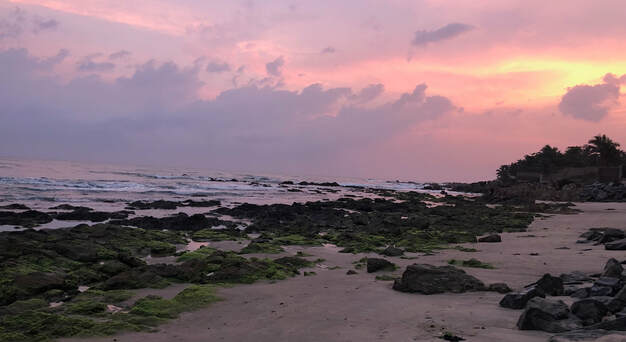|
As we headed back to Kokrobite after leaving BraSibi, I sat quietly in the backseat of Ernest’s car. The tears that had been welling up inside of me during my visit with BraSibi weighed heavily on me – in me, actually, and now I was just waiting for my chance to be alone and let them loose. But when we stopped at the tiny store on the corner of the main road and the road on which I lived, very near my house, where Ernest got out to deliver the little boy who had been with us to his mother, I followed Jahfar’s lead and stayed in the car. And when, a minute later, we drove right past my home at the AirBnB, I did not mention this fact, as I made it a rule to never tell any Ghanaian man where I lived. And so I continued on with these two, down to Big Milly’s. The entire area down there was now so crowded that it was startling; the road was fully lined on both sides with parked cars, and there were people everywhere. And there was noise everywhere – music blaring from too many different places, each one crying for attention.
I was ready to go my own way, but after Ernest parked the car and we all three stepped out together, it seemed, as we looked a little questioningly at one another, that our time together was not yet over. I didn’t know if Ernest wanted to talk or what, and maybe he felt the same from me – none of us seemed to have any clear intention. For my part, after all the time both of these men had given me, and the kindness they had shown me, I certainly didn’t want to be rude. And so we all walked slowly together, as if unsure of each next step, into Big Milly’s yard, where we continued to take each step slowly as we looked around at the busy scene before us. One of them asked me if I wanted to sit, but besides not wanting to commit to so much more time here that a table would be involved, there was a band playing with far too loud a sound system. When I said no, that it was too loud for me, Jahfar happily led us out to the beach, where he clearly felt most comfortable. But the beach was overwhelming, too, now more crowded than I had ever seen it, so bustling with people and little pop-up shops and… stuff that it now looked entirely different from the beach I had known in the past. As the amount of foreigners visiting the village increased as we neared the Christmas holiday, so did the number of local artisans flocking to the beach to sell their goods, and the whole scene outside of Big Milly’s by now felt quite a bit consumer-oriented. Ernest asked me if I wanted something to drink, and I saw a man selling coconuts near us and was very happy to take one. (I had never seen coconuts being sold here before, and now I realized that a consumer-oriented scene certainly had its up-sides.) The two men followed suit, and we each drank our coconut water, looking about us a bit bewildered by it all. When we each finished, the coconut guy hacked the coconuts open with his machete and chopped a little piece off each young green shell, with which to spoon out the meat. I generally don’t do well with heavy or fatty foods and so usually never bother with the coconut meat, but something told me to try it now, and with the first bite, in that moment it felt like the most nourishing thing on the planet. Once we had finished with our coconuts, it felt very apparent that the three of us were acquainted but not actually friends, and after a few moments of standing awkwardly together, Jahfar, friendly and polite and helpful as ever, took his leave to return to his shop. After another few moments, Ernest suggested that I take his phone number. I had made so many excuses for not giving out my number while I had been here, but now I not only took his number (which I never used) but also offered him mine (which he also never used). Then I wondered what was the properly polite amount of time for me to stay before excusing myself to finally return to my room and my solitude and my journal and all the feelings that were now safely buried just deep enough inside of me to allow me to function in this social environment… We leaned on an open table behind us, watching all the people – women walking through the crowd carrying baskets of fruit for sale atop their heads, artists selling their wares in their makeshift kiosks, a profusion of men passing this way and that as they conversed with one another, Westerners in bathing suits getting in and out of the ocean or walking to and from the entrance to Big Milly’s… We chatted for a while about all the changes in Kokrobite, about the noise. Ernest told me that now he mostly stayed out on the land, where it was so much more peaceful, and that he was planning to eventually leave and start a farm up in the Ashanti region. Ernest was well-known here, and he introduced me to a few of the men who were greeting him as they passed by, whom he thought I might remember from before. I did not remember any of them, but eventually I realized this was a good opportunity to ask after some other people I had known in the past. And so I went through my short list of four people – only four people that I knew well enough to think of and ask about – besides BraSibi, and besides one half-brother of Koro’s whom I had adored, but whom Ernest would not know. Only four people – two very close friends of Koro’s from Accra (who had originally connected him with Ernest and the land in Kokrobite) and two quasi-neighbors, and of those four, two, Ernest informed me, were now deceased. Azimba, the quiet, sweet, crazy Cameroonian guitarist who had been in Koro’s band in Accra, who, Koro loved to tell me, had played with Koro’s hero, Fela Kuti, had always been… well… “off in another world” – ever since, as a child, he was taken by the mmoatia (“dwarves” – in some ways like the equivalent of English faeries) in the forest; and Ernest and I now took a moment to reflect on what an extremely special being he had been. And Mawuli, the one person with whom I had kept in touch fairly regularly for a handful of years post-Koro, was the other one who had passed – right around the time we lost touch, according to when Ernest thought that it had happened. An older Rasta who used to come to Kokrobite to sell his craftwork, Mawuli had wanted to start an eco-tourism project in his home in the forests near Kakum, and I had been helping to support the project, which I had hoped, for a while, would eventually provide me with another future in Ghana… I had never hung out with Ernest before today, and we were not now all that talkative with one another. And I still had that ocean of emotion to let loose and move out of my body… Finally I felt that enough time had passed, and I told Ernest I was going to head home. And when he then asked where I was staying, I gave him the same vague answer I gave anyone (always men) who asked – “Just up the road a bit.” They all then guessed where I was staying, listing off some of the smaller guesthouses, and Ernest was no different. I replied in the same way I always did, with, “No, just in someone’s house.” This was my cue to smile and be on my way; I was not interested in having visitors. I appreciated what Ernest had done for me this day, and I appreciated his kindness, but I did not see him again. Finally alone back in my room at the AirBnB, I settled in for what I knew would be hours of writing and crying – releasing…
0 Comments
Ernest’s big red jeep was parked just in front of his house, and after saying goodbye to the young man who had been sitting with Jahfar while I had toured the site with Ernest, we all piled in – me, Ernest, Jahfar, and the small child who, Ernest now explained, loved to be with him. “He has been with me all day – I need to return him to his mother,” he said with a chuckle. Climbing into the backseat of the jeep, I reminded Ernest about one other time I had gotten into a similar red jeep with him, when he and a German friend of his had driven BraSibi and me to a mortuary in Accra early one morning. “Ah yes,” he said, remembering the incident well, “it was my friend Andrea who drove us.” I had known that, like me, Ernest had had no desire to go to the mortuary or spend any time with the family from whom Koro had been entirely estranged, who had arrived from the North the day before to retrieve Koro’s body for burial. The only reason I was going was to recover some of the belongings they had taken from the shack, before I had had a chance to go up there – as I, too, had only just arrived. BraSibi, ever of assistance, was accompanying me, and it was he who had insisted that Ernest go with us, though I had never really understood why.
I rode in the backseat of two privately-owned vehicles that day, both SUVs of some sort, one taking me to the mortuary and then one taking me to the home of some supposed relative of Koro’s, and inside both I felt like a child; with my feet barely reaching the floor in those big backseats, it was as if I was nine years old again, getting in the backseat of my father’s fancy car, to go on a ride to some destination I had no desire to visit – just fulfilling an obligation that someone else thought I should have. These SUVs felt fancy simply because they were not public transport – I had perhaps only once or twice before ridden in a privately-owned vehicle in Ghana, and I had felt so bizarrely, awkwardly privileged getting into them. It felt nearly as awkward to be getting into this one now – shouldn’t we be walking? This was the first time I had gotten into a vehicle since the ride from the airport to Kokrobite, and it had been wonderful to have a break from these noisy machines. Now I had the sensation of being back inside the belly of the beast, swallowed up. I remember feeling the same thing on that unpleasant day so many years ago, when I left the mortuary in that second huge SUV, with people I had never met before – again feeling like a child just doing what I was told. But at least I had had BraSibi sitting faithfully at my side, shepherding me through that trying day. Now, as we started down the road, Ernest spoke to Jahfar, who sat up front holding the little boy, in a local language, and by Jahfar’s reaction, I could guess that Ernest was explaining some bit about the story of our losing Koro. We drove back down to the main road, turned left towards Kokrobite, passed the next road – the middle road across from AAMA, which Ernest now pointed out was the one that Koro and I used to take out to the shack, and then turned up the next road over. At BraSibi’s house, one of his daughters told Ernest where we could find him – he had been staying at another house nearby, which he was caretaking while its owner was in England. Getting back into the car, Ernest sighed and said that, as to Koro’s untimely passing, “Still I question, ‘Eh, why? How?’ …And then I say, ‘No, this is not God’s doing.’ Eh, it is too much,” he said, shaking his head. “No, this I can never understand.” Ernest’s way of thinking about Koro’s death was clearly very different from my own; I had never felt the need to question the workings of the Universe, or the unfolding Path I traversed through my life, and somehow this had especially been the case when I lost Koro – I could never bring myself to question why. I stayed quiet in the backseat, just listening and observing, taking it all in... We stopped at another house not too far from the first, and Ernest and I got out of the car, Jahfar staying behind with the child who had now fallen asleep in his lap. Ernest knocked on the metal door in the tall cement wall bordering the large compound, and after a short wait, he was walking inside, with me following behind. …And then there was BraSibi – an older, greyer, perhaps slightly shrunken BraSibi, quiet as he always was, moving slowly and looking quite taken aback. As was I. The entire time I had been at the site with Ernest, I had been fine – “calm, cool, and collected.” But as soon as I was greeting BraSibi, I was struggling to keep the tears inside and to be able to speak without bawling at the same time. Dear, sweet, ever-helpful Bra Assibi. He loved Koro so very much. The last time I had arrived in Ghana – shortly after Koro’s passing, at the end of a very long and multifaceted journey from Maine (involving multiple planes, trains, and automobiles), in a shambles, and wearing the old black mourning shirt that had become my uniform, I had gone straight to BraSibi at AAMA. And when I stepped out of the taxi and BraSibi was waiting there for me, just outside AAMA’s gate, wearing the royal blue coveralls that were his uniform when on duty as night watchman, I had wondered how to greet him – a hug, a handshake? Back then he had stepped right up and hugged me. But now we were all formality and awkwardness, or perhaps we were both just too full of emotion to make any movement – using all of our physical capacities to try and hold it together – that’s how I felt, at least. Ernest told BraSibi who I was, but BraSibi knew; he said that he had been watching the road from the window and as soon as he saw me in the car, he had said to himself, “It is Susan.” Wow, it really was so hard to speak without crying. I couldn’t manage much at all until, after quite a long while, Ernest left us alone and I felt a bit more freedom to express myself. “There has never been another like Koro around these parts,” BraSibi was eventually saying, all of our shared thoughts on the past, on Koro, “no one as clever and bright as Koro.” “No, I have never met another person like Koro,” I struggled to say. Eh, it was impossible to speak to BraSibi without letting out some of my tears – just impossible, and I was very thankful that Jahfar had stayed in the car and that Ernest had now left us to ourselves. When BraSibi told me about how often he thinks of Koro, I struggled to tell him that, every day, Koro is still with me, that I think of him every day, but that I know he is gone and at peace, and that my life has indeed gone on without him – again, struggled to say all that without bawling. That was really hard to do – all the emotions that for the most part during this trip had seemed in the past were now completely taking hold of me, and just like the last time I had arrived and had gone straight to BraSibi, back in 2000, all I wanted to do now was cry a fountain of tears. I never thought I would find BraSibi, never imagined myself having this conversation. BraSibi was so clearly and so deeply hurt when Koro died… As we communed over the memory of our dearest of friends, BraSibi and I spoke slowly and tenderly, careful with our so suddenly raw, exposed hearts. And after what seemed a long while, eventually I felt not only the pressure that had been building within me – from all the tears pressing on me, desperate to be let loose, but also a pressure from without – of Ernest and Jahfar, these men I barely knew, waiting for me. Finally BraSibi and I agreed that I would come back for another visit before I left, and then all too quickly I was climbing back into the jeep. I knew I needed to be alone, ASAP, to let out the fountain of tears that was pressing hard on me, ready to burst through the dam that had been holding them back for too long already. Why was I even getting back into this car? What was I doing with these people? If I were to walk home, alone, I thought, maybe I would feel I had enough privacy to cry along the way… I was so used to having my freedom, to going it alone. But here I found myself, tied up in social etiquette, and again there was that feeling of the child just doing what she was told. I pushed my emotion and my tears further down inside, tucked them safely further away from the gateways – eyes, nose, throat – through which they would find their freedom. And then I settled in for the unnecessary ride back to the village. Well, I reasoned with myself, I suppose I don’t mind a ride back, and getting home a bit sooner – getting back to my journal a bit sooner… But this was not how it worked out… The day after Reggae Night, just past 4 pm – cool enough now for me to feel comfortable taking a long walk under the equatorial sun, Jahfar and I headed from his shop on the beach to the main road out of Kokrobite. As he led me through the more local part of the village, he informed me that Ernest had actually shown up at the beach outside Big Milly’s the night before, after I had left, and that he had told Ernest about our intention to pay him a visit today. This seemed like excellent news, as I figured it would greatly increase our chances of finding him at home. Jahfar was not at all bad company, and we had a pleasant walk out towards AAMA (the now defunct hotel/drum and dance school that Koro and I had lived near). Jahfar greeted at least half the people we passed along our way up the main road, all of whom were excited to see him, all eager to talk with him. I got the impression not only that he was a good guy, but also that he didn’t get out – meaning away from his little shop and the beach scene – often enough. I felt a tinge of disappointment when eventually we passed the middle road across from AAMA, the one I was fairly certain had been the road leading out to the path to the shack. When we turned up the next road, the last one across from AAMA – the paved road of which I had absolutely no memory, which, when exploring the area, I had been certain was not our road, Jahfar turned to me with a confident smile, searching my face for recognition. “Maybe this seems familiar…?” he prompted me. I smiled weakly and could only offer an accommodating, “Umm…,” as I meanwhile thought that Ernest must be living somewhere else now, that he must have wound up buying a different piece of land. We walked a while up this paved road, pausing at one point to break a couple twigs off one of the many young Neem trees lining the road, to use for cleaning our teeth – this was the traditional Ghanaian substitute for a toothbrush. The strong, bitter taste of the Neem, my herbal line of defense against malaria, always brought back bad memories – of more critical malarial times, but I enjoyed using it anyway, knowing that it was good for me. As we walked on, both of us engaged with our twigs, Jahfar occasionally made suggestions of things I might like to do – with himself as my guide, of course. Perhaps I would like to go for a swim in the pool at the hotel we now passed (looking much misplaced) on our left? Or climb up the little mountain stretching above it, to get a view of all of Kokrobite and its surrounding area? …Poor Jahfar. I had very little interest in doing much of anything outside of my simple agenda for this trip – revisiting the places I knew before, feeling what I felt, and writing. I also didn’t want to get too involved with him because I knew he had to have some sort of motive behind wanting to spend more time with me, and it was becoming clear that that motive (refreshingly at least not a pseudo-romantic one) was to do business; he wanted to help me do whatever kind of business might interest me, and I knew that in this regard he was dealing with the wrong person. He was also keen to help me with anything else with which I might possibly need help, and I was far too independent here to take interest in any of that. But Jahfar graciously accepted all of my obliging but noncommittal smiles, as well as my direct rejections of his numerous offers. And now, finally, he motioned to a two-story house placed just beside the road, with a big red jeep of some sort parked directly in front of it. I had never spent much time with Ernest, and I didn’t have much of a memory as to what he had looked like, other than the fact that he was tall. When Jahfar presented me to the man standing on the porch of the house, I did not recognize that this was Ernest, at all, and he did not recognize me; and as we stood before each other, both smiling and unsure, I began to wonder if perhaps this was a whole different Ernest and nothing would come of this trip. But when it was clear to all that no recognition was coming (Jahfar now looking as if he was beginning to wonder what the heck was going on), I tentatively asked, “Did you used to have a friend named Koro?” Now Ernest’s mouth dropped, and he seemed to drop, and suddenly, wow – realization dawned. Yes, this was the same Ernest all right. After astonishment and greetings and the laughter of relief that Jahfar had indeed connected the right people, I eventually asked, “But this isn’t the same land I lived on, is it?” “Yes, yes, it is the same land!” Ernest assured me, in an excited but soft-spoken manner; and immediately he led me along the wraparound porch and out back to the land. Jahfar stayed behind with another young man who was there, who had greeted us with such an enormous and confident smile, and such overflowing friendliness, that I had wondered if he was someone I was supposed to have known as well. Ernest was nothing but kind to me. He seemed… softer now than how I remembered him, and also just so much older. He took his time showing me all around the land, stayed with me as I slowly, piece by piece, took it all in. There were so many more trees now, and he told me about several of them – what had been planted when, etc. The ones I recognized from before – my good friends the Neem, whose leaves had kept me malaria-free for so long, and the beautiful Flamboyant, my favorite climbing tree – were huge, especially the Neem, its lowest branches now way above my head. “I used to hang my laundry on this tree,” I told Ernest; “back then it was all within reach.” I barely recognized the Flamboyant, now overshadowed by Ernest’s big house, which was built just beside it, throwing off my perspective. Once Ernest had confirmed that this tree had been here before and I could see that it was indeed the same tree I had known and loved, I tried to imagine how I had so easily gotten into it, back when all of its limbs were so much lower to the ground. This Flamboyant had not only been my favorite climbing tree, but its uppermost limbs had also been my favorite place for doing my eye exercises. Perched amongst the highest branches, even back then I could see the ocean. I looked up at our little mountain-hill, the sun now approaching it, as I had seen it do so many times, just around the time I would be preparing our dinner. The sun was my timepiece when I lived here, and its position relative to that giant hill (which we always thought of as a mountain) was what I checked on the most, right around this point in the day, as it would tell me how much daylight I had left within which to complete whatever tasks I had going on, before we would be plunged into darkness, with only a candle to perhaps eat or read by. Halfway up the little mountain stood the white edifice that had been under construction when I was here, from which Koro had gathered scraps of wood that he and BraSibi and one other friend used to completely reconstruct the shack in a more waterproof manner before the rainy season began. I had been looking at these reference points – the little “mountain” and that huge white structure astride it – while making my last exploration of the area, trying to place the shack in relation to them; and looking at all of it now, from this perspective, right here, it all finally just looked so perfectly placed. Yes, this was indeed where I had lived. In a way it was all changed, and in another way, it – the site – was just as I remembered it. When I told Ernest about trying to find the site a few days before, and not at all thinking it was off of this road, he told me it wasn’t this road, because this road did not exist back then! “We put this road in when we built the house,” he explained, and now I could see why his house was placed just beside the road, not at all set back – when it was built, it was probably the only house out here, this new road like one long private driveway. “Koro used to enter from the next road over,” Ernest said; “there was a path.” Yes, part of the reason why the site looked so different now was due to the elimination of that long path – which had led to the shack from the current middle road across from AAMA, as I had thought. All that remained of the shack was the foundation, a small rectangular perimeter of cement – that and the square hole in the ground inside of it, which Koro had called “the fridge.” The “fridge” was a space underground into which you could lower a basket of food tied to a rope, to keep it cool – though I think perhaps there was supposed to be some other element to it, like that the bottom was supposed to be filled with sand and ocean water(?), which, of course, never happened. Koro had considered this a great technology, but to me it never made much sense – as, in reality, it seemed to just be a place for insects and rodents to settle. It was funny to now see this as one of the only traces of the shack’s existence. There had been a cement floor, but that was now completely gone. What was amazing, though, was to see how very small the shack had been – so much smaller than I remembered it. Yes, in my memory it was small, but... bigger than that! It looked so tiny now. It was nice to be there, but, of course, I really just wanted to be alone – with the land, the trees, the site, my memories… And I wasn’t – Ernest stayed with me, and we chatted off and on, quietly, slowly. We took our time, looking at everything, walking all around, and as I took it all in, I remembered to take some pictures, in my mind hearing countless friends telling me to. I kept harboring a faint hope that Ernest would leave me alone out there for a while, so I could just BE, ALONE, THERE, as I so often was before; but he did not, and for whatever reason – perhaps just not wanting to seem impolite within this culture of extreme hospitality, I did not feel comfortable asking him for some time alone. I wasn’t about to hurry through my visit either, though, and Ernest did not seem to mind the long stretches of silence. I don’t think I had ever had a single conversation alone with Ernest before, just the two of us, and I had little to say to him. Having traversed the property, once again we stood near the back of the big house that he and his Swiss wife had built, a beautiful structure, standing apart from all the cement houses around the area through its incorporation of wood and stone. After he had told me about it in the same steady, quiet way in which he had told me about the land – offering a few details about its construction, the type of roof it had, the solar panels on the roof, etc., I finally thought to ask Ernest about BraSibi. “Yes, Assibi is still living around here, too,” he said, to my surprise. And after a little more time had gone by – a little more looking and quiet intermittent chatting and trying to stretch out these precious moments touring my old home, I asked how I could find him. “Ok, let’s go then,” Ernest said with a soft smile, and he began to walk leisurely towards the stairs leading to the porch. I followed behind as slowly as I reasonably could, trying to gather myself, or ready myself, my emotional body meanwhile bouncing around as if looking for another option besides following him – BraSibi??? Now??? Here and now – BraSibi?!?! And not only that, but also suddenly back to this other character Jahfar – whom I had actually told nothing concerning how I knew Ernest or why I wanted to visit him, and, too, here was that other young man who now, again, was greeting me with the utmost hospitality, and also the toddler who had been here when we arrived, who was now on Jahfar’s lap… all of these people… all just a slightly overwhelming shift in energy to suddenly have to interact again… and back to movement… already leaving the land… and really?!?! I was about to see BraSibi?!?! BraSibi, Koro’s closest friend around Kokrobite, was the one who had been the night watchman at AAMA. He was the witness at our City Hall wedding, and he was the one who had cared for me when I fell sick, with my third round of malaria, during my last, post-Koro trip. BraSibi was the one person who had been there for us, to help with every possible thing with which we ever needed help. He was the only person I had thought I might look for during this trip – but then had no way to since AAMA had shut down, the only person from my life before that I really cared to see. …I had hoped to see the site during this long-awaited trip to Ghana, but I never expected to see BraSibi… I planned to make my next visit out to AAMA and near the old site on Sunday, four days after my thorough exploration of the area. The night before, Saturday night, was Reggae Night at Big Milly’s, the old guesthouse; and for once I decided to go out at night, both to check it out and to hopefully ask after Ernest, who had owned the land on which Koro and I had lived.
Setting out from the house, I prepared myself to pass through a street full of men whose unwanted attentions were generally amplified at night, made all the worse by the cover of darkness and the increased presence of alcohol; and as I started determinedly down the dirt road, I put out an extra-strength version of my usual “not interested” vibe. (Sometimes the vibe worked, sometimes it didn’t…) Thankfully, the only person who called out to me now, as I neared the guesthouse, was the young ringleader of the group of boys, maybe around ten or eleven years old, for whom I often bought fruit when I made a stop at the fruit stand that was down this way. By now they knew my usual patterns, and so the whole gang looked at me in confusion as I passed by, a few of them turning their hands up as if to say, “What are you doing? Out so late? And no fruit???” I shrugged my shoulders and shook my head and continued on to the gate to Big Milly’s property, where I had to pay a small fee before being let inside. Finding a nice spot to stop and survey my surroundings, I took in the scene. The DJ on the stage was playing music that did not interest me, and no one was dancing yet. (I had known when I left the house around 9 that it was probably still too early for the “party,” but I had waited as long as I could – before losing any desire to go out.) The first thing I had noticed upon walking in were a few pool tables set up near the gate, and this was a bit of an interest – it had been years since I had played. But looking at all the men currently playing, I let go of the idea when I didn’t see anyone I felt I wanted to join. A lot of people were gathered at the bar – never my place. And as the restaurant fairly full of diners also did not draw me… before I knew it, having found Reggae Night itself predictably boring for me, I felt myself heading straight for the beach. But stepping through the gate opposite the one through which I had entered the yard, this suddenly seemed a bad idea, as I was now right in the midst of dozens of men out there on the beach. I had been reluctant to go to Reggae Night at all because I was dreading dealing with all the men who had been trying to talk to me on the street earlier that day – all telling me they would see me at Reggae Night… Well, what I had found time and again in Ghana was that, without an escort, the only way to keep men from trying to talk to you is to talk to one of them; and in this regard, I lucked out. The first Ras who called me over, I soon found, was not at all a bad sort. Sitting on a bench beside him and a couple of his friends, talking about this and that, having learned that he was from the Ashanti region (and typically very proud of his Ashanti heritage), was a couple years younger than myself, had been here in Kokrobite a handful of years, had a small shop here on the beach and was all about doing business – ever since he first went out on the streets of his hometown selling small items as a kid (any cross-cultural business idea I might have, he said, he was eager to help me get started)… and having shared with him that I had lived around here eighteen years before… I eventually asked whether he knew Ernest – “an older Rasta,” I said, “who’s been around here for a very long time.” I didn’t expect the first person with whom I spoke to know him, but still I was a little disappointed when he said he did not – thinking that this meant I would have to find someone else to ask. But after a minute or two, he asked if Ernest was tall or short, and when I said he was quite tall, it came to him – “Ah, yes! Ernest – he is living with a woman from Europe…” And then he told me, smiling, not only that he did indeed know who Ernest was, but also that… he had been to his house! Meaning that he could lead me to him! “He lives way down the road out of Kokrobite, maybe a twenty-minute walk,” he said. “Out by AAMA, the old run-down hotel?” I ventured. “Yes, very near there. We can go there,” he offered excitedly, “ – whenever you like.” Eureka. “Can we go tomorrow?” After making our plan for the following day, I surprised myself and stayed out longer, enjoying the view of the full moon and the ocean, while talking about nothing in particular with my new acquaintance, Jahfar. And when finally I stood up and said that I was going to leave, I was exceedingly pleased that Jahfar neither protested nor asked me for my phone number nor tried to walk me home. I had him show me where his shop was, told him I’d come by around 4 pm (by which time the weather would have cooled), and that was that. In this setting… this truly felt like a small miracle. Though by now the party was going a bit stronger, as I passed back through the yard around 11 pm, with a live band now on stage (playing some rather uninspired reggae covers) and some (uninspiring) dancing going on, the scene inside Big Milly’s still held no interest for me, and after a moment of taking it in, I continued on through the street-side gate opposite the beach. Delighted to find myself on a blissfully empty road – such a rarity, I walked back to my home at the AirBnB feeling really good. Really… in the flow. With it – with the Divine Flow. Conscious of it. He will take me to Ernest tomorrow… And I only had to talk to one guy! The Universe had brought me directly to the right person… Back at the AirBnB, after a quick shower, I got back to my journal as I went through my night-time stretching routine on the floor. Do I even want to see Ernest? I now asked myself. Ernest and I had never been friends, by any means, and I reminded myself now how I had felt about him – while I had not known him at all well, I had always gotten the impression that there was something a bit shady about him, something a bit untrustworthy. …But he knew Koro, I told myself. And it could be our site he’s living on. And that is what I want to see… The night after my thorough exploration of my old “neighborhood,” as I was lying in my little one-person tent (easy mosquito netting) on the floor, unable to sleep for the thumping bass blasting through my earplugs, I found myself suddenly saying aloud, “Koro, I’m here. Where are you?” I had always had this sense, though much more strongly early on in the first few years after he passed, that Koro wanted me to come back to Africa, to somewhere in Africa. But now that I was finally here… it was striking how I really had not been feeling Koro here. And now that this question had been aired – not even as words on the page or a thought in my head but audibly – the sound of my voice coming as a shock, the immediate response that surfaced in my mind was… Koro has moved on.
Well, as there was no sleep in sight (and by now this was really becoming an irritating issue for me – all the late-night, loud recorded music preventing me from being able to sleep), I switched on my handy solar reading lamp, returned the pen beside it to my hand, and, as I so often did, I took my journal from its night-time spot right above my head and set it back to use… Koro has moved on. Yes, now that I was back, now that I had answered his call to return, I could feel how… freed he was. But also… he was me, and I was him – we were One. Koro had always been a reflection of myself – and at the best of times, my Self – that much was always clear. We were there together, first and foremost, to allow the other to come to know the Divine more – more “up close and personal,” to come closer to the Divine One than either of us had ever been before, or become closer with the Divine One; and serving as a reflection for each other had been one piece of our magic puzzle, one aspect of this revelation of the One that was unfolding in so many ways. …I had long been aware that the idea, the feeling, of him calling me back to Africa – that was the Divine calling me back, my Inner Voice calling – guiding me along my own, divinely-inspired Path. It was Koro, it was the Divine, and it was me – all the same. ...And feeling now how Koro has moved on, how freed he was… I felt how freed I was. Koro has moved on. I put it down on the page, where all things solidified for me. And now it is officially time for me to move on as well, I continued. Koro is satisfied. I am satisfied. And that divine element that is both beyond our individual selves as well as living within us as our true Self… that One is satisfied, too. …Africa is a big place, I went on. And there is so much to explore. Ghana felt like just the beginning, “the tip of ice,” as Koro would put it – and not only because I was on my way to Guinea, but also because lately I had so strongly been feeling Mali coming in my distant future (very distant future), and I was beginning to have an interest in exploring some other parts of Africa where opportunities were arising as well – Egypt, Morocco, etc. Go deeper, my hand was now scrawling on the page… |
AuthorAharona Shackman has used writing as her primary practice for connecting with the Self pretty much since she learned to write. With the commencement of this blog, she is now beginning to practice the sharing of some of her writing... Categories
Archives
September 2020
|
Proudly powered by Weebly
